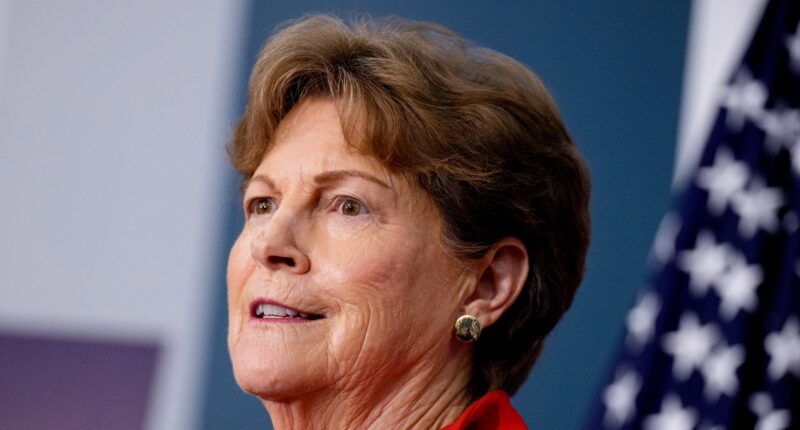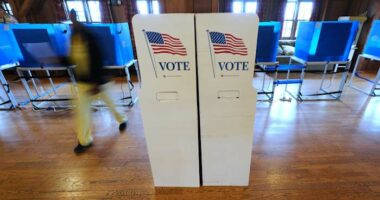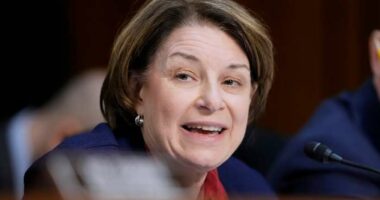Share this @internewscast.com
WASHINGTON — The federal government remains shut down, with the Senate struggling to gather the 60 votes needed to reopen it, and no negotiations are taking place between the leaders of the two parties.
Republicans control the Senate but require at least eight Democratic caucus members to join them in overcoming a filibuster and ending the shutdown. So far, only three have sided with them: Sens. John Fetterman, D-Pa.; Catherine Cortez Masto, D-Nev.; and Angus King, I-Maine. The others hold firm as the party demands health care funding concessions in exchange for their support.
With no substantial discussions happening between Senate Majority Leader John Thune, R-S.D., and Minority Leader Chuck Schumer, D-N.Y., attention shifts to rank-and-file senators who could be key to resolving the stalemate.
The House, meanwhile, has canceled its session for next week, keeping the focus on the Senate.
Here are three key Democratic senators to watch.
We’d like to hear from you about how you’re experiencing the government shutdown, whether you’re a federal employee who can’t work right now or someone impacted by closed services in your everyday life. Please contact us at tips@nbcuni.com or reach out to us here.
Jeanne Shaheen, D-N.H.
Shaheen occupies a unique position for several reasons. She’s a senior member of the Appropriations Committee, responsible for writing government funding bills, and she disfavors shutdowns. Shaheen was among only two Democratic caucus members (along with Sen. Angus King, I-Maine) who voted for the previous Republican bill to prevent a government shutdown, which passed in March.
Additionally, she’s the principal author of the Democratic bill to permanently extend Obamacare subsidies, set to expire at year-end, the party’s main demand in the current deadlock. As Shaheen is retiring after this term, she is free from political pressures.
“There are a lot of people on both sides of the aisle who think we need to address this,” Shaheen said, of the Obamacare subsidies, citing recent polls that show substantial support for extending them to avoid premium hikes. “I think it’s important, and it’s a message to not only our Republican colleagues, but to the White House.”
A source who has spoken to Shaheen said she recognizes the headwinds Democrats face as the minority party and has spoken to colleagues in search of the best possible outcomes on a health care solution. The source spoke on condition of anonymity to discuss private conversations among senators.
Shaheen is seen by Republicans as someone they can deal with; she’s nobody’s idea of a partisan flamethrower. If there’s a deal to break the logjam, it probably runs through her.
Sen. Jon Ossoff, D-Ga.
Ossoff is the only Democrat running for re-election next year in a state won by President Donald Trump in 2024. The first-term Georgia senator has held his cards close to the vest during the shutdown and has been strategic in his occasional breaks with his party during his Senate career. But in each of the four recent votes on bills to fund the government, he has supported the Democratic plan — which extends Obamacare funding and undoes Medicaid cuts — and opposed the Republican one.
Ossoff said his vote is “to keep the government open and to prevent massive increases to Georgians’ health insurance premiums next year.”
He faulted Trump for telling Republicans not to negotiate with Democrats, while urging the GOP to “work with us to find a bipartisan path forward and to prevent a massive increase in health insurance premiums for Georgia families.”
For now, Trump and Republicans are shouldering more of the blame for the shutdown than Democrats, according to four recent polls. That gives Ossoff some breathing room. But he won’t want to alienate swing voters who may prove crucial to his quest for a second term in an ultra-competitive state.
If the public turns on Democrats in the shutdown fight, Ossoff will face immense pressure to flip. If not, it could mean that the GOP strategy of holding out until Democrats feel the heat and cave is failing.
Sen. Brian Schatz, D-Hawaii
Schatz was one of the 10 key Democrats who voted to drop the filibuster and allow Republicans to pass a six-month government funding bill that prevented a shutdown at the most recent deadline in March. Schatz didn’t vote for the underlying funding bill like Shaheen and King did, but his and other Democrats’ votes to allow Republicans to get around the filibuster provoked a furious response from the liberal base.
Schatz is in a unique position as a Schumer deputy who has his finger on the pulse of both the Democratic conference and the party base (including its younger and more online activists). He’s among the limited group of senators who are adept at social media, where much of the debate is taking place. And he’s in pole position to be the next Senate Democratic whip and replace the retiring Sen. Dick Durbin, D-Ill.
In the run-up to the current shutdown, Schatz offered “free advice” to Republicans, vowing that “another jam job is not going to work” and that the GOP needs to negotiate with Democrats to achieve a successful product. He made good on that warning.
Schatz could be a bellwether for the direction of the caucus and whether a sufficient number of Democrats can accept a bill to reopen the government. If he’s on board, other fence-sitters in the conference may feel more comfortable supporting it.












